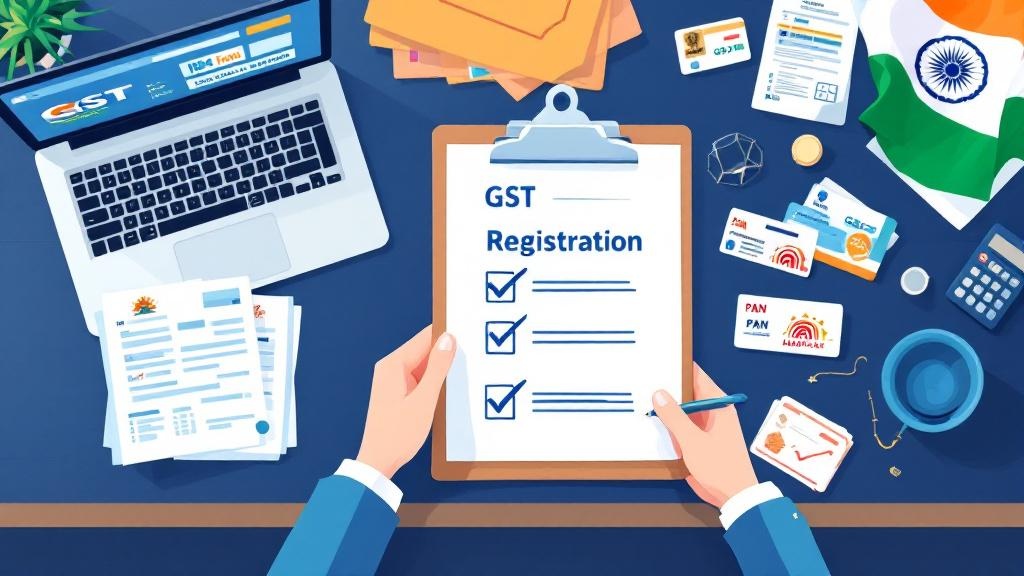If you’re a small business owner in India, chances are you’ve heard a lot about GST (Goods and Services Tax)—but might still be wondering, “Do I need to register for it? How do I do it? What happens if I don’t?” Don’t worry, you’re not alone.
This guide breaks down everything you need to know about GST registration in a way that’s easy to understand, whether you’re just starting out or looking to formalize your operations.
What is GST?
GST, or Goods and Services Tax, is a unified indirect tax system introduced in India in 2017. It replaced various state and central taxes like VAT, service tax, excise duty, etc. With GST, there’s now one tax for the entire country, making compliance easier and reducing the tax burden on businesses.
Whether you’re selling goods, offering services, or running an e-commerce store, understanding GST is crucial to stay compliant and grow your business legally.
👉 For a hassle-free GST registration process, you can visit FinTax24’s GST services for professional assistance.
Who Needs to Register for GST?
Not every business in India needs to register for GST, but there are clear thresholds and conditions. Here’s who must register:
1. Turnover Above Threshold Limit
-
For goods: Annual turnover exceeds ₹40 lakhs (₹20 lakhs for special category states).
-
For services: Annual turnover exceeds ₹20 lakhs (₹10 lakhs for special category states).
2. E-commerce Sellers
If you sell products or services online (via Amazon, Flipkart, your own website), GST registration is mandatory—regardless of turnover.
3. Interstate Supply
If your business supplies goods or services across state borders, you need GST registration even if your turnover is below the threshold.
4. Casual Taxable Persons
If you’re running a business temporarily in another state (say a stall at an exhibition), GST registration is required.
5. Reverse Charge Mechanism
If you deal in sectors covered under reverse charge, registration is required regardless of turnover.
Benefits of GST Registration for Small Businesses
While it might seem like extra paperwork, getting registered under GST has real advantages:
-
✅ Legal recognition as a supplier of goods/services
-
✅ Access to input tax credit (ITC) on your purchases
-
✅ Easier to expand your business across India
-
✅ Build trust with customers and suppliers
-
✅ Eligibility to participate in government tenders
Documents Required for GST Registration
Before you start the registration process, keep the following documents ready:
For Proprietorship:
-
PAN Card of proprietor
-
Aadhaar Card
-
Proof of business address (utility bill, rental agreement)
-
Bank account details (cancelled cheque or bank statement)
-
Passport-size photo
For Partnership/LLP:
-
Partnership deed or LLP agreement
-
PAN cards of partners
-
Address proof of all partners
-
Proof of principal place of business
For Private Limited Company:
-
Certificate of incorporation
-
PAN of company
-
PAN and Aadhaar of directors
-
Address proof
-
MOA and AOA
How to Register for GST: Step-by-Step
Step 1: Visit the GST Portal
Go to the official GST portal. Click on ‘Register Now’ under the taxpayer tab.
Step 2: Fill Part A of the Application
Enter basic details like:
-
PAN
-
Mobile number
-
Email ID
-
State and district
An OTP will be sent for verification.
Step 3: Fill Part B
You’ll need to fill in:
-
Business details
-
Promoters/partners details
-
Principal place of business
-
Goods/services details
-
Bank account information
-
Upload necessary documents
Step 4: Verification with DSC or EVC
You can verify your application using Digital Signature Certificate (DSC) or Electronic Verification Code (EVC).
Step 5: ARN Generation
Once submitted, you’ll receive an Application Reference Number (ARN). Use this to track your application status.
Step 6: GSTIN Allotment
If everything checks out, you’ll be issued a GSTIN (Goods and Services Tax Identification Number) within 7 working days.
Common Mistakes to Avoid During GST Registration
Registering for GST isn’t rocket science, but errors can delay your approval. Avoid these common slip-ups:
-
❌ Uploading blurry or mismatched documents
-
❌ Incorrect PAN or Aadhaar numbers
-
❌ Wrong business address (must match proof)
-
❌ Not declaring all business places
-
❌ Using personal bank accounts without documentation
Double-check everything—especially if you’re doing it yourself. Or better, get expert help.
What Happens After Registration?
Once you receive your GSTIN, here’s what you need to do:
-
Start issuing GST-compliant invoices
-
File monthly or quarterly GST returns
-
Maintain proper sales and purchase records
-
Pay GST dues on time
Failing to comply can result in penalties, fines, or even cancellation of your registration.
Penalties for Not Registering Under GST
Thinking of skipping GST registration? Think again.
The GST department is serious about compliance. Here’s what you could face:
-
Penalty of ₹10,000 or 100% of tax due (whichever is higher)
-
Seizure of goods and business assets
-
Ineligibility to claim input tax credit
-
Loss of credibility among customers and vendors
Bottom line: It’s better to get registered than to deal with penalties later.
Voluntary GST Registration – Is It Worth It?
Even if your turnover is below the threshold, you can register voluntarily. Why would someone do that?
Advantages:
-
You can claim input tax credit
-
Build credibility and trust
-
Easier to scale operations nationally
-
Join the formal economy
It may involve a bit of extra work, but the long-term benefits often outweigh the hassles.
FAQs on GST Registration
❓ Can I run multiple businesses under one GSTIN?
Yes, if all your businesses are in the same state and under the same PAN. Else, you’ll need separate GSTINs.
❓ How long does it take to get GST registration?
Generally, 7 working days. However, it may take longer if documents are missing or need clarification.
❓ Do I need a professional to register for GST?
Not necessarily. You can do it yourself online. But if you’re unsure or want to avoid delays, it’s smart to consult a GST expert.
Final Thoughts
Getting your GST registration right is a critical first step toward building a credible, scalable, and compliant business. Whether you’re a freelancer, a boutique store owner, or an e-commerce entrepreneur, understanding GST can help you grow without legal hiccups.
Don’t let the red tape hold you back. If you’re looking for professional support, check out FinTax24’s GST services to make your registration process smooth and error-free.
Want more tips for small business success? Subscribe to our blog for updates on compliance, finance, marketing, and more.






Comments (0)